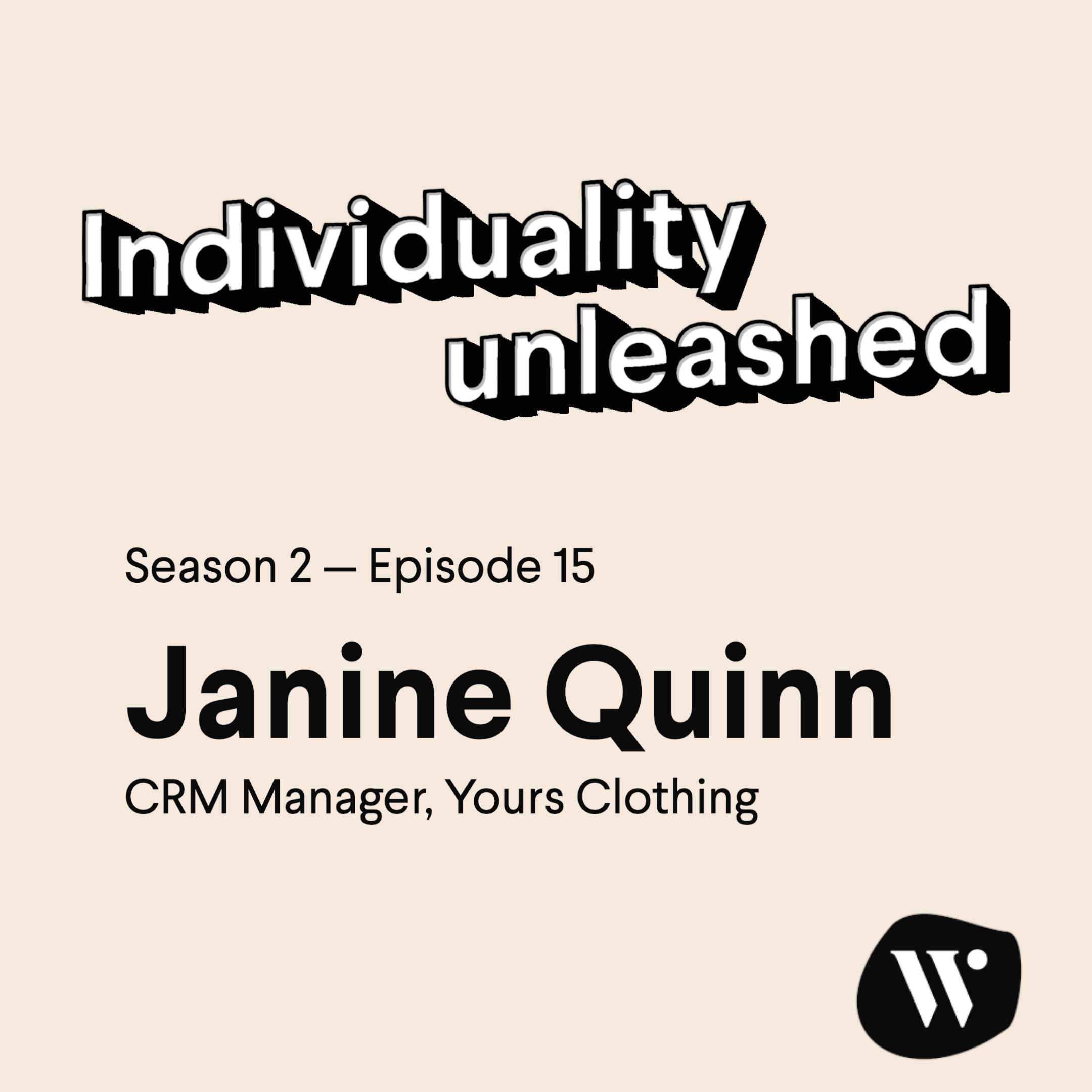Inflation and the Retail Recession
- 0.5
- 1
- 1.25
- 1.5
- 1.75
- 2
Vern Tremble: Welcome to Individuality Unleashed. I'm Vern Tremble, senior director of marketing at Wunderkind. And we're happy to see you again today. We are all about helping retailers drive more awareness for their brands, attain more customers, keep those customers and ultimately drive more revenue for their business all without having to use third party cookies and ultimately being able to use their own channels in order to do that. Today, I'm joined by Richard Jones, our CRO, and we're going to be talking about a super important topic today. It is inflation and the retail recession. So we don't want you to get nervous. This is a very topical, very important conversation that we're going to have, but we're going to share some real serious insights with you guys today and hopefully provide some value and some calm in the face of the storms and all these headwinds to help get you through some of the challenges that we'll face considering this impending recession. So Rich, thank you so much for joining us today. How are you?
Richard Jones: Good, sir. Very good to be on Individuality Unleashed again, and looking forward to dig into such a depressing topic.
Vern Tremble: I mean, it is. It is serious, but we are going to supply ways to get through this depressing moment and this depressing topic with humor and a lot of actionable insight and value that our viewers and listeners can take back to their marketing teams to help them overcome this hurdle. Sound good?
Richard Jones: Let's do it.
Vern Tremble: Sweet. So all signs, as I said, point to recession. Just checked out some stats from the fed and they said that there has been a 6.4% inflation increase over the last few months, which the-
Richard Jones: And the rest.
Vern Tremble: Right. Which this was a cool stat, which was also the last time since January of 1982, that inflation has been so high. So just a point of reference, I wasn't even born yet.
Richard Jones: Yeah, I was 43. Not quite, but I can tell you this isn't my first inflationary cycle. Most of my childhood was in a really tough inflationary cycle.
Vern Tremble: So it should be good for you guys to hear that we have someone here that has experienced this and is not making it up. He knows what's going on. So prices obviously are increasing and it's impacting consumers as well as brands. Rich, what I'd love to start with today is understanding and having you shed some light on the current market landscape and what retailers should be thinking about and considering, considering these economic headwinds.
Richard Jones: Well, let's start with an example to set the scene. So recently cosmetic brand Revlon filed for chapter 11 bankruptcy protection and they're household name. So it sparked a lot of concern that more retailers will be next. Sky rocketing prices of course have decreased demand for certain goods and push consumers to rethink their priorities, which is troubling for retailers who find themselves sitting on inventory that they may no longer need. Also on the back of all these supply chain delays to get the inventory in the first place.
Vern Tremble: That's really tough, Rich, just trouble on top of trouble. What are we looking at right now?
Richard Jones: Well what you typically see in the recession of course, is that as prices go up sales go down, which can lead to job losses, stagnating business growth, and even bankruptcies. So it's particularly hard for small family owned businesses, as they often lack the resources to weather the harder times. The only thing that's really weird about the situation we're in right now is that, of course we haven't got the job losses yet. I mean, there is some job losses for companies that'll be tighten their belts, but overall the job market is still very, very good, but many larger retailers are also facing challenges that might make it tough to face a recession and increasing debt unfortunately is also one of those things that's weighing in right now to the slowing revenue growth, the squeeze margins, the higher business expenses and a slump in sales.
Vern Tremble: So it sounds like it's an ebb and flow. It's something that we've experienced before, but certainly something that we could handle I assume, we'll get to that, but can you give us a little bit more insight on the scene that we're in?
Richard Jones: So, I mean, if you think about it, retailers that have weaknesses, the foundations of their IT and supply chain infrastructures are particularly vulnerable and struggle to cope with the lack of in- store traffic or perhaps the demand on digital or the instability in the supply chain. And this is all happening on the back of issues on the product supply side, we've lockdowns in zero COVID China. We've moved on from COVID, but of course, China's right in the middle of these zero COVID lockdown policies, which are delaying shipments to the US and the hike in prices of raw materials is following. So the price of cotton, for example, has more than doubled in the last two years causing issues for fashion retailers in particular. And polyester is also an issue because it's derived from oil.
Vern Tremble: So this is just abundantly clear how this could be impacting retailers. I mean, their textiles at minimum is being impacted by all of this.
Richard Jones: Yeah, and there is also this threat of the so- called stagflation, which is when slow economic growth, usually due to high unemployment occurs simultaneously with rising prices due to inflation. So if retail sales do drop and unemployment will rise, we could end up in a stagflationary scenario. So overall it's a pretty tricky situation with many contributing factors, but retail prices are increasing unsustainably and inflation unfortunately is likely to continue well into 2023.
Vern Tremble: So all in all challenges ahead.
Richard Jones: Yes.
Vern Tremble: And we honestly can't avoid it. So the thing that I'm interested in learning right now is how does inflation or how will inflation impact consumer behaviors. I'm certain our brands would want to know that as well.
Richard Jones: And as the cost of living kind of really starts to squeeze with all of these price rise, all this inflationary pressure consumers obviously pull back on spending as they wish to save money in terms of uncertainty. Unfortunately, there is a very, very large percentage of the US population that only has about around a month of available capital to pay their bills if something goes wrong and they have job losses, so people are going to need to save to weather this uncertainty.
Vern Tremble: And I mean, I imagine that can only get worse. It's like prices are going up and for the most part, businesses are either not increasing salaries or for some folks in certain geos and certain industries they're losing their jobs.
Richard Jones: Yeah, no, 100%. Now a report by the NPD group showed that in the first three quarters of 2022, consumers bought 6% fewer items than they did last year and more than eight in 10 consumers plan to cut spending in the next three to six months. So it's definitely happening.
Vern Tremble: Yeah. So can you give us more about what customers are thinking about as far as the resources they have to even be able to weather this storm?
Richard Jones: Well, unfortunately, many customers have been relying on their credit cards to keep up with the rising prices. We've seen that in many places around the world, which is why consumer debt levels are nearing and all time high. And this also isn't sustainable. So it's likely that soon customers will be forced to cut back drastically. And when they do retailers will need to be prepared because it's going to affect their sales. Now, consumers, aren't buying just fewer items, they're also shopping less often, which means retailers also lose out on impulse purchases.
Vern Tremble: So consumers really have a choice here and they're going to make those choices based on what's available to them. So that's certainly something that retailers should keep in mind, I would imagine.
Richard Jones: Yeah, but let's face it also, this isn't a kind of one size fits all issue as things are today. The extent to which inflation affects consumer behavior does depend on demographics, which is where knowing your customer really is key. Americans with lower incomes are really feeling the pinch right now. Whereas now for at least wealthy consumers in places like Europe and the US are continuing to splurge on luxury goods.
Vern Tremble: That's really interesting, I mean when you think about the demographics of your consumers, you really have to split your mind in understanding how should I be communicating with them considering the economic hardships and the economic hard times that a lot of our consumers are facing, or the ones that aren't facing the economic hard times.
Richard Jones: And it's effecting industries differently. Home goods, fashion and department stores are likely to come under the most strain. The Commerce Department reported that furniture and home furnishing retailers, electronics, and appliance stores and health and personal care chains all saw month over month declines. And another report showed that retail sales plunged 20% from February to April.
Vern Tremble: Wow.
Richard Jones: With fashion, seeing the largest decline at 89% followed by department stores at 45%. Which is why, Vern, I am doing my bit to help the fashion industry with the purchase of this new melon hat.
Vern Tremble: Which I love by the way, you're going to have to send me one.
Richard Jones: I'm not going to get run over by a car crossing the road with this on, I'll tell you that.
Vern Tremble: No, I imagine it's super reflective so I can imagine your nighttime jogs, you'll be all fine. But again, all jokes aside. We want to balance out the seriousness and the humor, but this sounds really bleak, Rich, I can't understate it and we can't shirk about it, but I want to talk about how we could potentially find a silver lining in this dark gray cloud if you will, are there any opportunities out there? Are there positives for retailers doing this recession?
Richard Jones: 100%, there always is. But you just have to look harder for them. So past recessions have taught us that they expose existing weaknesses. They accelerate emerging trends and they force organizations to make structural changes faster than they otherwise would have, which is why recessions are always very furtive grounds for innovative thinking, for the launching of new business models, for creating new companies, launching new brands. I myself started up my company that I sold a few years ago in the Great Recession, 2009. So it really is a time for creative thinkers to get unleashed. And this is particularly true in the retail sector. During the Great Recession of 2008, 2009, eCommerce flourished while brick and mortar retails declined. And that was a trend that continued after the economy recovered, of course.
Vern Tremble: And certainly a lot of people picked up on that trend and were able to make that strategic shift to take advantage of those opportunities.
Richard Jones: Now, clearly the situation is a huge challenge for retailers. We don't want to pretend that it's not, and the industry is likely to look much different than it did before as we come through and out the other side of this recession. But those who take on the challenge and successfully adapt to new trends, could well emerge stronger and offer their employees, their customers, and their key stakeholders a brighter future.
Vern Tremble: I love it, Rich. Well, so what I want to know is what does that look like? You talked about the company that you built during a recession, a recession being a time of fertility, if you will, and innovation and ingenuity. Can you talk about the kinds of things retailers could do to sustain business and marketing performance and even grow during a challenging market?
Richard Jones: Yeah, well, the most important thing is to go where the headroom is and headroom means you don't have a market share minus a market share that you won't get right. At tough times, retail leaders can fall into the trap of trying to do everything at once and launching too many initiatives that don't actually drive a real business impact. And this can be a big mistake at a time when your budgets, your time, your resources are more limited than normal and getting the highest return on those resources is actually what is paramount. Retailers need to understand where their headroom is and inform a strategy to actually get at it. And of course, a bit of a shameless plug, but this is something that we do at Wunderkind, which we do normally in a normal economic times, but it comes even more important in a recessionary time. And that is we help retailers and brands deliver more return on ad spend. And we encourage in our customers and our prospects to think about finding out in their Google analytics and all their other packages, what's the weaker performing paid media they have. Translate that over to Wunderkind and we will guarantee a much, much higher return on that ad spend through exposing a new revenue performance channel that they're not used to, or they have not been doing very well and actually take that and do it on turbo charts on steroids and really delivering great results. And it's all about being the most efficient you can with the spend that you have. So that's really key.
Vern Tremble: So should brands be thinking about acquisition? Should they be thinking about retention? What's the focus there?
Richard Jones: Yeah. I mean a lot of customers will... Okay, downturn, it's going to be hard to get new customers. Let's really focus on our most loyal customers. That makes sense to a point. But the thing is you're already getting a substantial amount of money out of your most loyal customers. That's why they're the most loyal customers. And if they suddenly start spending 25% less, because the recession, most of that will come out of what they spend in your stores or online. And that's why actually your most loyal customers are not necessarily your best source of revenue growth in a recession.
Vern Tremble: That's so interesting.
Richard Jones: Yeah. And you think about it, you're unlikely also to succeed in stealing customers who are fiercely loyal to other retailers as well. Your best opportunity is actually for revenue to look at who are the switchers. Now these are the people who spend money both in your shops and elsewhere. And if you take, say 20% of what they're spending today, but you manage to increase that to 30%, you'll achieve a net gain even if their total spending drops by 25%.
Vern Tremble: So then how do we do that? How do we figure out who those people are?
Richard Jones: Well to do that you need to identify the people that are shopping with you and with other retailers, and then figure out what they're buying elsewhere or what they want and can't find at all, and then adjust your offer to meet their needs better. And one of the best ways that you can do this is understanding your customers better, that do come to your online channels and engage with you there. So identity is increasingly important.
Vern Tremble: That's really phenomenal. Rich, again, more incredible answer what else can you tell us about this time? What else should retailers be looking at?
Richard Jones: Well, of course we can't talk about any of this without considering the significant acceleration of digital that we saw during the pandemic. Retailers have had to be nimble and meet consumer needs in new, more convenient ways, such as buying online, pick up in, store curbside pick up and delivery, et cetera, et cetera. Now, consumers are open to new digital experiences. We saw that in the pandemic, whether it's virtual payments or online grocery order and delivery, retailers that have the systems in place that offer these options are faring better than others. And I think we're going to see that accelerate in a recession, but to do that, you got to have solid supply chain and IT infrastructure to roll out new digital experiences quickly and retailers without that solid foundation must fix that leaky bucket hole quickly to survive what's coming next.
Vern Tremble: That's good. Leaky bucket hole. Yes, because that's happening again, bleak, but so many great opportunities you just highlighted to us, Rich. Is there anything else?
Richard Jones: There is one other that we should also mention is that mergers and acquisitions also increase in recessions in terms of there's going to be a lot of companies that wouldn't normally, ordinarily have put themselves up for sale being forced to do so. And I think if you've got a keen eye on looking at the opportunities to add what are actually great businesses that just being under undue pressure because of the extreme nature of what happens in a recession, there's great inorganic growth opportunities for well capitalized businesses. So we'll see much more of that as well in the coming months.
Vern Tremble: That's amazing and excellent exit opportunities for those smaller businesses that have invested a lot-
Richard Jones: Not always excellent in a recession.
Vern Tremble: Not always excellent, but there's a silver lining is what I should say. There is an opportunity somewhere baked in all of that I should say. So this is great, Rich and I think everything that you hit upon is certainly valuable to me as a marketer, but I'm certainly hope hoping that it's valuable to the brands out there that are looking for strategies to help them ultimately weather this moving storm. I want to shift gears just a little bit real quick on a topic that is near and dear to all marketers hearts out there from a company that had it's humble beginnings, but continues to dominate the news cycle with any utterance of a change or any semblance of evolution, we hear about them. And I want to talk about Google and this third party cookie deprecation that they keep yanking us along with. As you know, Google pushed back deprecation of third party cookies for a second time to 2024. And ultimately this gives marketers for me it might be an opportunity to get their ducks in the row and really leverage solutions that harness first party data, as opposed to third party data to ultimately drive their strategies into the future. What would you say to brands that are dragging their feet right now, as they wait for this deprecation to actually happen?
Richard Jones: Well it's definitely happening. You can only kick the can so far down the road, the privacy hasn't gone away, ad tech disruption hasn't gone away, legislative pressure on those things hasn't gone away. So it's definitely, definitely happening. And what we're going to see is third party cookies disappear from our toolkits. They're kind of ubiquitous digital marketing approaches that relied on them are rapidly going to become obsolete. And our research shows that companies and customers disagree about the utility of cookies, even though about 78 to 85% of brands in the US rely on cookies to maintain sales. Most marketers now are well advanced in creating strategies to survive beyond in the cookieless future. So we are helping, for example, over 650 leading retailers to prepare for the cookieless future with game changing identity technology that drives sustainable growth through first party data. And that is the biggest shift that we're going to see out of all of this privacy driven ad tech disruption.
Vern Tremble: Have other brands picked up on this, are they realizing what's happening right now?
Richard Jones: Yeah, I mean everyone's realizing, I think, but was an Adweek article recently that showed there's a growing trend in brands that see Google's delay as mostly irrelevant as they've begun the process of finding alternative to third party cookies. Now Chrome obviously represents a significant portion of the ecosystem, but brands have gotten the hint. They need to find another way. And most marketers are decently advanced in thinking through this as a strategy, whether they've got to where they need to be is another thing. But of course, Google, I think this will be the last time they kick the can down the road, just because I know they're torn because of the amount of money they're going to lose by deprecating the third party cookie advertising. But as I said, the impact of their business from the legislation that's being threatened is bigger. So I think this is the last time that they'll kick the can down the road.
Vern Tremble: That's interesting. Rich, one of the things I want to call out to our audience is that we have in fact, released a new guide to the cookieless future, because the cookieless future is inevitable. It is happening and we want you to be prepared. You can actually go to www. Wunderkind.co to download your copy of this cookieless future guide. In that guide, we will talk about topics around how to fuel growth with first party data. We'll also highlight a leading brand that scaled communications and increased revenue using first party data and ultimately will uncover how to scale channels to produce greater ROI, which is significantly important to our brands out there that are looking to weather the storm of this impending and looming economic recession. Rich, before we get out of here, again, like I said, this session, this podcast episode was going to be a little bleak. We kept it a little light, but in all seriousness, we do want to, and we did want to shed light on the looming impact of inflation and the retail recession that is out there that quite frankly is at the front steps and the front door of most retailers out there. I want to give you an opportunity to sum this up, give any final words of encouragement or advice to retailers out there that are facing these economic headwinds.
Richard Jones: Well, couple of things, as I said, treat this as an opportunity to get more efficient with the spend that you do have to drive the best return. I can guarantee you that there are opportunities to do that and to deliver better results and better return on your advertising spend as a retailer and download the cookieless future report. Not only is it dope, but it also talks about the sorts of things that you need to do to survive the cookieless future and build your business around first party data, is also the same set of things that you can do to increase the efficiency for say the bottom five or bottom 10% of your advertising budget, redeploy it in a different way that will get you far, far higher return on advertising spend and capture whole loads of first party data, which is super important for where ad tech disruption is driving us as marketers. So don't miss out.
Vern Tremble: This is phenomenal. Rich, again, thank you so much for joining us again today. I think you have delivered so much valuable insight to our audience. I hope that you guys stay tuned for future episodes, as we hope to weather this storm right along with you, we are right there at the front lines, paying attention to these trends and these developments, making sure that we're delivering this information to you in a succinct way that you can use, take back to your team, deploy and ultimately help drive increased revenue. So again, Rich, thank you so much for joining us today.
Richard Jones: Thank you, Vern.
Vern Tremble: Thank you. And again, that's Individuality Unleashed. See you next time.
DESCRIPTION
In this episode Vern Tremble, Senior Director of Marketing at Wunderkind, and Richard Jones, CRO, Wunderkind, discuss the issues retailers are facing post-COVID; increasing debt burdens, moderating revenue growth, compressing margins, and more. At Wunderkind we believe that by rising to the challenge brands, and companies, can emerge stronger, provide a better future for their consumers by sympathizing with the times, and communicate with personalized messaging to suit their economic hardships.
2:25 - The Current Market Landscape and What That Means for Retailers
5:57 - How Will Inflation Affect Consumer Behavior?
10:00 - Positives for Retailers During a Recession
11:57 - Things Retailers Can Do to Sustain Business and Marketing Performance
17:51 - Third-Party Cookie Deprecation and Converting to First-Party Data
22:10 - Final Thoughts







